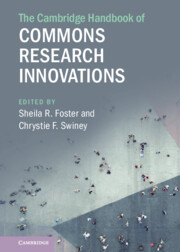Book contents
- The Cambridge Handbook of Commons Research Innovations
- The Cambridge Handbook of Commons Research Innovations
- Copyright page
- Contents
- Figures
- Tables
- Contributors
- Introduction
- Part I Revisiting the Origins and Evolution of Commons Thought
- Part II Averting New Tragedies
- 4 Averting Tragedy of the Resource Directory Anti-Commons
- 5 Time and Tragedy
- 6 Transforming Climate Dilemmas from Tragedy to Cooperation
- Part III New Forms of Contested Commons
- Part IV Urban Landscape and Infrastructure as a Commons
- Part V Reassessing Old and New Institutions for Collective Action
- Part VI Managing and Restoring the Commons
- Part VII Law, Legal Theory, and the Commons
- Part VIII Technology, the Internet, and the Future of Commons Governance
- Index
4 - Averting Tragedy of the Resource Directory Anti-Commons
A Practical Approach to Open Data Infrastructure for Health, Human, and Social Services
from Part II - Averting New Tragedies
Published online by Cambridge University Press: 29 October 2021
- The Cambridge Handbook of Commons Research Innovations
- The Cambridge Handbook of Commons Research Innovations
- Copyright page
- Contents
- Figures
- Tables
- Contributors
- Introduction
- Part I Revisiting the Origins and Evolution of Commons Thought
- Part II Averting New Tragedies
- 4 Averting Tragedy of the Resource Directory Anti-Commons
- 5 Time and Tragedy
- 6 Transforming Climate Dilemmas from Tragedy to Cooperation
- Part III New Forms of Contested Commons
- Part IV Urban Landscape and Infrastructure as a Commons
- Part V Reassessing Old and New Institutions for Collective Action
- Part VI Managing and Restoring the Commons
- Part VII Law, Legal Theory, and the Commons
- Part VIII Technology, the Internet, and the Future of Commons Governance
- Index
Summary
‘Community resource directory data' comprises information about the accessibility of health, human, and social services that are available to people in need. Such services are provided by a fractured landscape of governments, nonprofit organizations, contractors, and other civic institutions. Institutions that fund services don’t tend to collect information about the accessibility of those services – and service providers often lack strong incentives to promote this information themselves. Instead, directory data tends to be aggregated by ‘infomediaries,’ for use in their proprietary channels, or for sale to third parties as a commodity. The result is a knowledge anti-commons, in which resource data is simultaneously overproduced and underutilized – a tragedy that causes systemic dysfunction across the so-called safety net. This paper outlines a set of strategic interventions pursued through the Open Referral Initiative – a community of practice that has developed data exchange standards, open source tools, and pilot projects through which multiple stakeholders experiment with new methods of sharing resource information as open data. The paper’s final section outlines a set of institutional designs that can hypothetically sustain the provision of trustworthy open resource data as a public good.
Keywords
Information
- Type
- Chapter
- Information
- The Cambridge Handbook of Commons Research Innovations , pp. 45 - 54Publisher: Cambridge University PressPrint publication year: 2021
